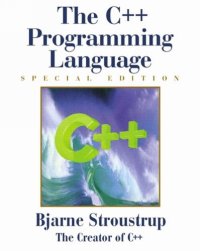C++ for C programmers, part 1 of 2
May 2010
 As Stroustrup said, there’s no such programming language as C/C++. C and C++ are two different beasts.
As Stroustrup said, there’s no such programming language as C/C++. C and C++ are two different beasts.
I’m not going to argue here about which is better. For small or embedded projects, the complexities of C++ can get in the way. For larger projects, some of the features of C++ are very useful.
I’m simply going to list the features C++ adds to C, from an ex-C programmer’s point of view (yes, I was one of those people who believed that C++ was just “C with classes”). The idea is to follow the links to further information if you want to know more about any of them.
This is part 1 of 2, the non-OO features:
- Default arguments to functions: defining
int read(int bufsize =512)means that if you callread()without arguments it’s like you calledread(512). - Somewhat related is function overloading. You can define a function twice, with two different argument lists. The compiler will use the “closest match” when you call it. For example, defining
int print(int n) {...}andint print(const char* s) {...}means you canprint()both ints and char strings. - The compiler uses ambiguity resolution to resolve all these overloaded functions.
- You can declare local variables wherever in the code you need them, not just at the start of a function (also a C99 feature). This means variables can be declared closer to where you use them. The variable is scoped to the
{...}block you put it in. - References, as in
int& x. This isn’t some weird Microsoft-only syntax for smart pointers. I started to think of these as pointers without all the*‘s, but they’re quite different. An alias is another name for the referred-to object, usually used for pass-by-reference — and unlike pointers, you can call sayswap(x, y)instead ofswap(&x, &y). Aconstreference means you’re not allowed to change the object it refers to. - Const-correctness in general. This is not just a C++ thing, but C++ folks tend to be stricter about it (usually for good reason).
- A namespace just groups a bunch of names together (functions or variables). C should have had them all along, to avoid everyone having to use their own brand of
mylib_myfunc()pseudo-namespaces. See also theusingkeyword in its various forms. - The built-in boolean type,
bool, withtrueandfalsekeywords (also in C99 viastdbool.h). - The
inlinekeyword and associated quirks, including implicit inlining and auto-inlining. - Most people don’t realise it, but
(not f or n == 5)is both valid Python and valid C++, thanks to ISO646-style operator keywords. - A much larger standard library than C. The Standard Template Library (STL) is definitely worth knowing, especially the container datatypes like
vector(growable array) andmap(associative array), and the STL algorithms such asfind()andsort(). C++’s iostreams are just plain weird (I mean, using the bit-shift operators to print stuff out?), but they’re here to stay. Of course, you can still use all of C’s standard library, and if you#include <cstdio>instead of<stdio.h>, you’ll get the names in thestdnamespace, as instd::printf(). - Linking C++ code to C code has several gotchas.
Please send your feedback, and let me know if I’ve missed any non-OO features. The following week’s entry contains the second part describing the object-oriented features C++ has added.
Comments
Fabien 3 May 2010, 23:50
You forgot the most important:
Don’t use malloc, free, new[], delete[], or even delete.
Do use std::string, std::vector<>, and smart pointers.
Loup Vaillant 4 May 2010, 00:37
Talking about gotchas, I prefer the FQA over the FAQ. Quite depressing, but more entertaining.
Jason Baker 4 May 2010, 00:47
You might want to consider calling this part “1 of 2”. I was trying to figure out exactly what part one half meant. :-)
José Carlos Penfield da … 4 May 2010, 02:18
Hi !
The tutorial is excellent and is now part of my bookmarks, under the heading of useful tips.
However, i can’t let a comment pass uncommented. :)
The advice of not using new, new[] and their associates delete and delete[] is rather questionable.
C and C++ share the same philosophy of supposing a programmer aware of the risks. The languages usually trade extreme security for extreme performance.
And while malloc()/calloc() and free() should be generally avoided in terms of orthodox C++ programming, sometimes their use is recommended. For instance, when you got to pass a pointer to a C library.
Kevin Bowling 4 May 2010, 07:08
Looking forward to part 2.
caf 10 Aug 2010, 17:44
You might want to mention that `inline’ is also a co-feature with C99.
coder 26 Aug 2010, 05:46
Thanks for posting this, I have this book, but a lot of things have changed since this book has been published. Thanks again for posting this! :-)
Coder 23 Nov 2010, 06:35
Thanks for posting this information, very helpful when comparing C and C++, thanks again! :-)
Geoffrey Hunter 23 Oct 2012, 11:20
I would be interested to know why malloc is ‘acceptable’ in C yet frowned upon in C++.
Ben 23 Oct 2012, 11:45
@Geoffrey: in embedded systems, you often don’t use either malloc or free (heap allocation can be dangerous). But to answer your question more generally, here’s a StackOverflow answer on that — basically new is usually better because it’s type safe and calls your constructors.
Sayeed Sezan 28 Nov 2012, 08:36
Your post so is informative. I like C and C++ programming. thanks